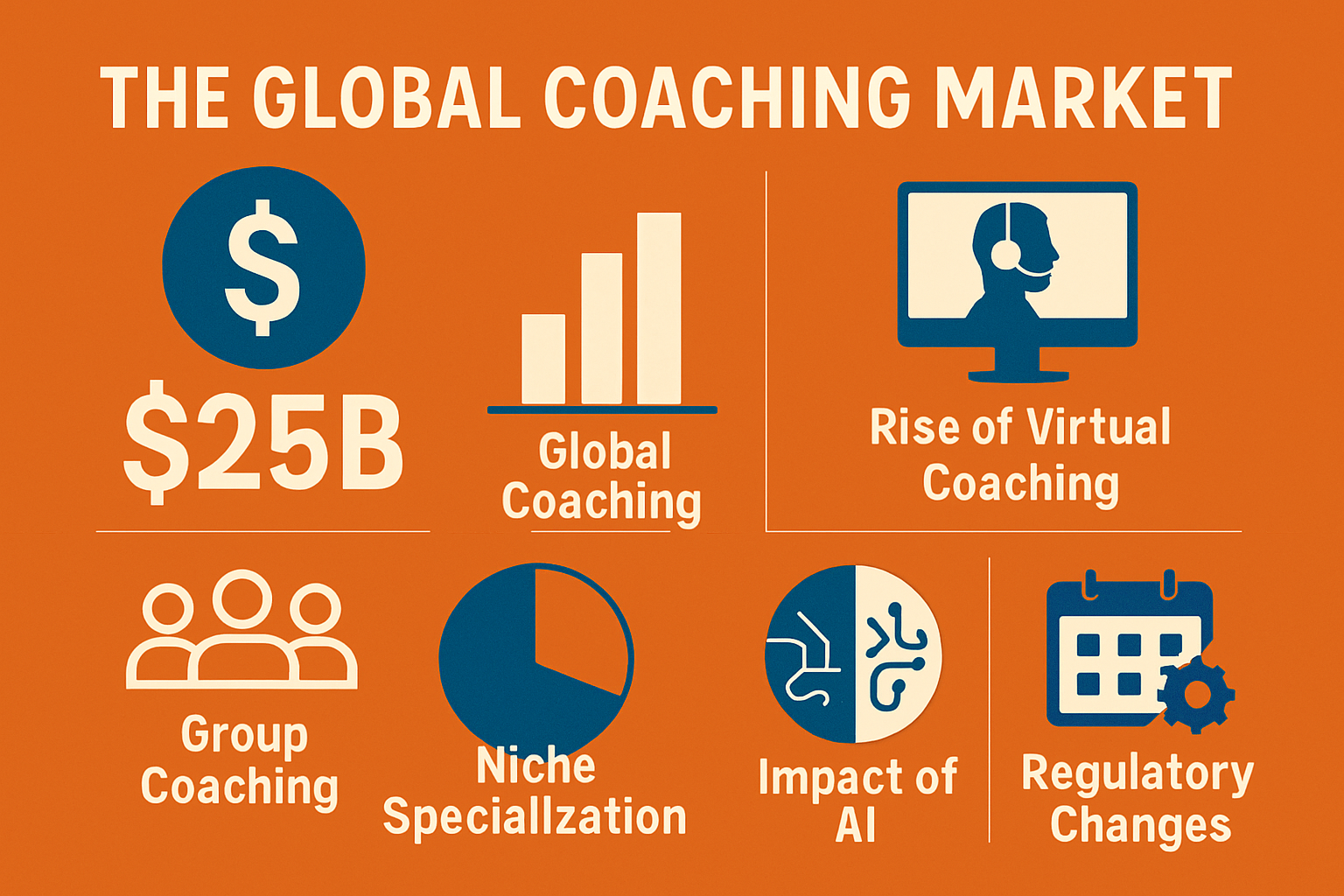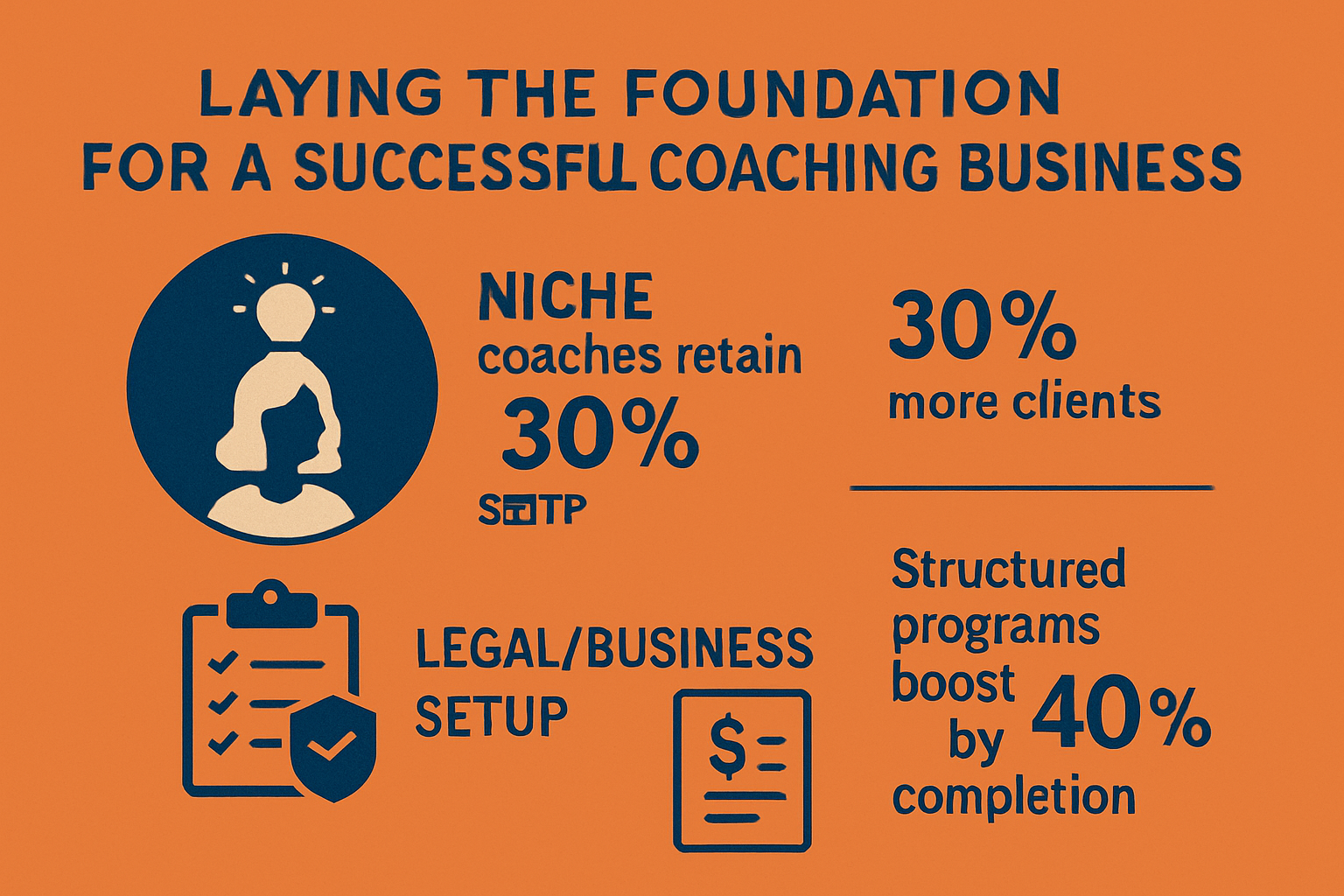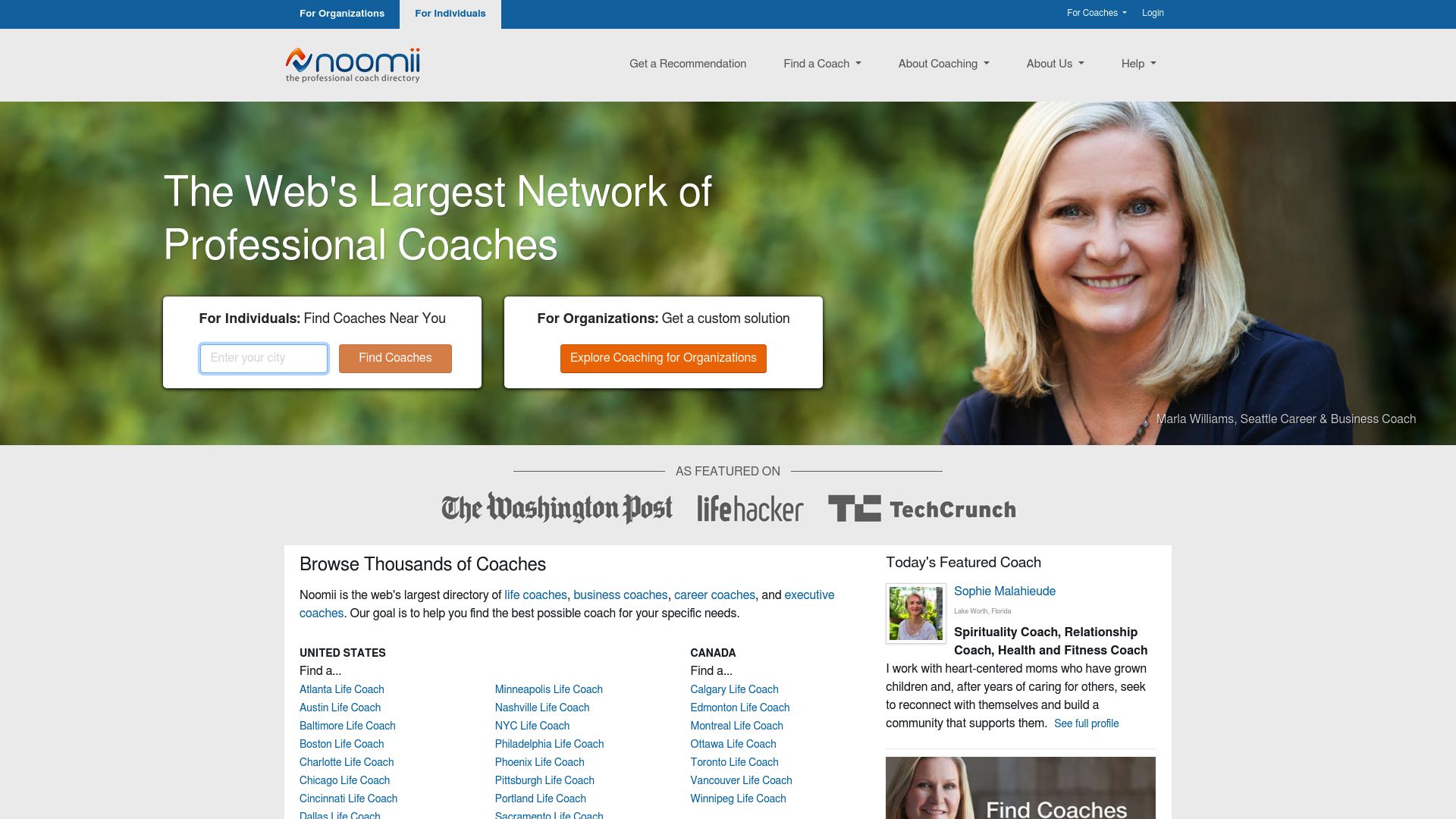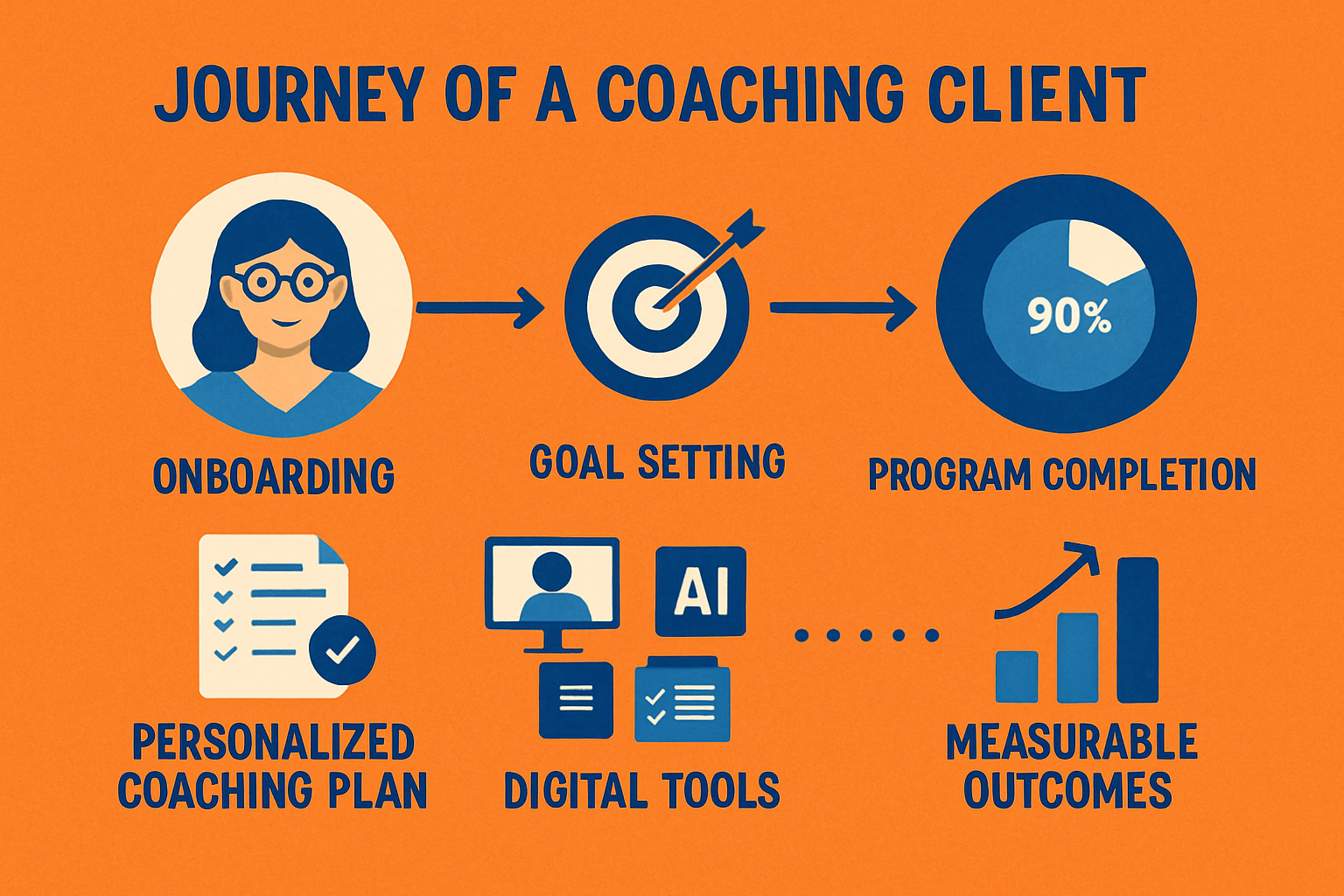Posted on August 16, 2025 by Don Markland
Are you ready to make 2025 the year you finally build a successful coaching business? With the coaching industry expected to soar past $25 billion, there’s never been a better time to turn your passion for helping others into a thriving venture. In this guide, you’ll discover the latest market trends, expert strategies, and step-by-step actions that empower both new and experienced coaches. We’ll cover everything from finding your niche and attracting clients to harnessing digital marketing and scaling your impact. Get ready to unlock the tools and insights you need to stay ahead, stand out, and create lasting change.Understanding the 2025 Coaching Landscape
The coaching world in 2025 is evolving at a rapid pace, offering both challenges and exciting opportunities for anyone seeking to build a successful coaching business. Staying on top of industry shifts and understanding where the market is heading will give you the edge needed to thrive.
Market Trends and Growth Opportunities
The global coaching industry is growing exponentially, with projections indicating it will surpass $25 billion by 2025. This surge is driven by several key shifts that every successful coaching business should watch closely:- Virtual Coaching Takes Center Stage: Remote client relationships have become the norm, allowing coaches to reach a wider audience and offer flexible scheduling.
- Demand for Niche and Specialized Coaching: Clients are seeking experts in areas like executive, wellness, or career coaching. Specialization not only meets client needs but also increases perceived value.
- AI and Automation: Technology is reshaping how coaches deliver services, from AI-powered assessments to automated scheduling and engagement tools.
- Personalization and Flexibility: Clients now expect tailored experiences, measurable outcomes, and adaptable coaching structures.
- Regulatory Changes: New professional standards and data privacy regulations are raising the bar for credibility and trust.
- Hybrid and Group Coaching Models: Group sessions and hybrid programs are gaining popularity, offering scalable impact and community support.
| Trend | Traditional Coaching | 2025 Coaching Landscape |
|---|---|---|
| Delivery | In-person | Virtual/Hybrid |
| Client Focus | General | Specialized/Niche |
| Technology Use | Minimal | AI & Automation |
| Program Structure | One-on-One | Group & Hybrid |
| Outcome Tracking | Informal | Measurable KPIs |
Identifying Your Unique Value Proposition
In a crowded marketplace, the difference between a thriving and struggling successful coaching business often comes down to a clear, compelling unique value proposition (UVP). Differentiation is more important than ever. Consider these proven ways to stand out:- Specialize: Focus your practice on a specific niche or audience. Data shows 70% of clients prioritize specialization when choosing a coach.
- Leverage Your Story: Share your personal journey, credentials, and unique methodology to foster authenticity and connection.
- Showcase Results: Use testimonials, case studies, and measurable outcomes to build trust and demonstrate your expertise.
- Transparent Communication: Clearly articulate the value you provide and the transformation clients can expect.
| Coaching Brand | Unique Value Proposition |
|---|---|
| Thrive Leaders | Executive coaching with neuroscience focus |
| Wellness Pathways | Mindful wellness coaching for educators |
| Momentum Careers | Career transition coaching for women |
Laying the Foundations: Setting Up Your Coaching Business
Building a successful coaching business in 2025 starts with a solid foundation. Whether you’re new or experienced, clarity and structure are the keys to long-term growth and impact.
Defining Your Coaching Niche and Ideal Client
The first step to a successful coaching business is finding your sweet spot—your niche and your ideal client. Begin by reflecting on your expertise, passions, and the problems you love to solve. Pair these insights with market research to determine where demand meets your unique skillset. Consider these steps:- List your top skills, certifications, and experiences.
- Research trending niches using industry reports and client surveys.
- Profile your dream client: their goals, challenges, and preferred coaching style.
- Test your ideas with pilot sessions or surveys.
| Step | Action |
|---|---|
| Self-Assessment | Identify strengths & passions |
| Market Research | Analyze demand, competition |
| Client Profile | Define demographics & pain points |
| Validation | Pilot and gather feedback |
Legal, Financial, and Operational Essentials
Setting up your successful coaching business isn’t just about coaching skills—it’s about getting your legal and financial house in order. Begin by choosing the right business structure, such as an LLC or sole proprietorship, to protect your personal assets and clarify taxes. Next, pursue certifications or join professional coaching associations to boost credibility. Open a dedicated business bank account, set up basic accounting, and secure insurance to cover your practice. Don’t overlook compliance. Regulations like GDPR and HIPAA safeguard client data and privacy. Maintaining these standards is essential for client trust and professionalism in a successful coaching business. Here’s a quick checklist to guide your setup:- Register your business legally
- Obtain necessary certifications/memberships
- Open business banking and set up accounting
- Get professional liability insurance
- Ensure data privacy compliance
Pricing Models and Packaging Your Services
Pricing is more than numbers; it’s a reflection of your value and expertise. In a successful coaching business, the right pricing model can attract your ideal clients and support sustainable growth. Explore these common structures:- Hourly: Simple, but may limit income potential.
- Packages: Prepaid sessions or programs, often with a discount.
- Retainer: Ongoing monthly support for steady income.
- Group: Lower price per person, higher overall revenue.
| Pricing Model | Pros | Cons |
|---|---|---|
| Hourly | Flexibility | Income not guaranteed |
| Packages | Predictable revenue | Requires upfront payment |
| Retainer | Stable cash flow | Commitment required |
| Group | Scalable, efficient | Less individual focus |
Attracting and Converting Coaching Clients
Attracting and converting the right clients is the backbone of every successful coaching business. In today’s dynamic landscape, coaches must master personal branding, digital marketing, and strategic visibility to stand out. Let’s explore how you can consistently fill your practice with engaged, ideal clients while building trust and authority.Building Your Personal Brand and Authority
Your personal brand is the heart of a successful coaching business. It’s how clients connect with you before their first session. Start by crafting a bio that reflects your journey, expertise, and passion for helping others. Share your unique story and qualifications—these elements differentiate you in a crowded market. Use testimonials and case studies to build social proof. When clients see real transformations, they’re more likely to trust your process. Post before-and-after stories, highlight client wins, and collect feedback to showcase your impact.- Curate a consistent visual identity across your website and social media
- Share client reviews and transformation stories regularly
- Update your credentials and achievements to reinforce your expertise
Digital Marketing Strategies for Coaches
Digital marketing is a powerful engine for any successful coaching business. Start by developing high-value content—write blogs, host webinars, or launch a podcast. These educational materials position you as an authority and provide a steady stream of leads. Choose social platforms where your audience spends time. LinkedIn is ideal for executive clients, while Instagram and Facebook work well for lifestyle and wellness niches. Regularly share insights, tips, and client stories to keep your audience engaged. Email marketing remains one of the best ways to nurture leads. Create a simple lead magnet, such as a free guide, and set up an automated welcome sequence. This keeps your coaching business top-of-mind and builds relationships over time. A quick comparison of content channels for coaches:| Channel | Strengths | Best for |
|---|---|---|
| Blog | SEO, authority, evergreen content | Education, thought leaders |
| Podcast | Intimacy, reach, storytelling | Personal growth, wellness |
| Webinar | Live engagement, lead generation | Skill-building, business |
How Online Coaching Directories Accelerate Growth
Online directories are game changers for a successful coaching business. They boost your visibility, connect you with pre-qualified leads, and provide credibility through verified reviews. Platforms like Noomii use smart algorithms to match coaches with clients actively seeking support. Many coaches double their inquiry rates after listing on a reputable directory. These platforms streamline the client search process and showcase your credentials, making it easier for potential clients to choose you.
Key features to look for in a directory:
Many coaches double their inquiry rates after listing on a reputable directory. These platforms streamline the client search process and showcase your credentials, making it easier for potential clients to choose you.
Key features to look for in a directory:
- Smart matching tools to pair you with ideal clients
- Integrated booking and messaging for seamless communication
- Verified client reviews to build trust
Creating Transformative Client Experiences
Creating transformative client experiences is the cornerstone of any successful coaching business. The ability to foster real, lasting change for clients not only drives satisfaction and referrals but also sets your practice apart in a crowded market. Let’s explore how to design impactful programs, leverage modern tools, and measure results for continuous improvement.
Designing High-Impact Coaching Programs
The heart of a successful coaching business lies in well-structured, client-centered programs. Start by mapping the client’s journey, including clear milestones and regular check-ins. Use proven goal-setting frameworks—like SMART or GROW—to ensure sessions stay focused and actionable. Build in accountability systems, such as progress trackers or shared action plans. For example, a 12-week executive transformation blueprint might include weekly sessions, mid-point assessments, and a final review. This structure keeps clients engaged and motivated. Customization is key. Some clients thrive with standardized programs, while others need tailored approaches. Consider this comparison:| Approach | Pros | Cons |
|---|---|---|
| Standardized | Efficient, scalable, easy to market | May lack personal relevance |
| Customized | Highly relevant, builds loyalty | More time-consuming to develop |
Tools and Technology for Enhanced Delivery
Technology is transforming how coaches deliver value. Video conferencing platforms allow you to serve clients globally, while scheduling tools and client management systems streamline logistics. Embracing digital workbooks, interactive assessments, and online communities increases engagement and accountability. AI-driven assessments and progress tracking are becoming industry standards. For coaches seeking to stay ahead, exploring AI integration in coaching can unlock new ways to personalize sessions and monitor outcomes. These tools help you identify patterns, adapt strategies, and create a seamless experience. Balance is essential. While automation boosts efficiency, genuine human connection remains at the core of every successful coaching business. Use technology as an enhancer, not a replacement, for your unique coaching approach.Measuring and Communicating Client Outcomes
Clients expect tangible, measurable progress from their coaching investment. Set clear KPIs at the start of each engagement—these might include career advancements, wellness improvements, or skill development milestones. Implement pre- and post-program assessments to track growth. Share data-driven results with clients using visual reports or progress summaries. This transparency builds trust and encourages referrals. Regularly gathering feedback allows you to refine your methods and demonstrate the impact of your work. By consistently measuring and communicating outcomes, you reinforce the value clients receive, ensuring your successful coaching business continues to thrive and grow.Scaling and Future-Proofing Your Coaching Business
Ready to take your successful coaching business to the next level? Scaling effectively and preparing for the future ensures you stay ahead in a fast-changing industry. Explore how to diversify your offerings, build meaningful partnerships, streamline your operations, and adapt to emerging trends—all essential to sustaining a thriving and successful coaching business.Building Multiple Revenue Streams
A core strategy for a successful coaching business is expanding beyond one-on-one sessions. Diversifying your income sources provides stability and opens up new growth avenues. Consider these revenue streams:- Group Coaching: Serve more clients at once while fostering a supportive community.
- Online Courses: Package your knowledge for self-paced learning.
- Workshops and Masterclasses: Offer intensive experiences on specialized topics.
- Corporate Contracts: Partner with organizations for team development.
- Licensing Frameworks: Allow others to use your proprietary methods.
| Revenue Stream | Benefits | Example Use Case |
|---|---|---|
| Group Coaching | Scalable, interactive | Career transitions group |
| Online Courses | Passive income, broad reach | Self-paced leadership |
| Workshops | Deep dives, networking | Wellness weekend events |
| Corporate Contracts | High value, recurring income | Team coaching for SMEs |
Creating Strategic Partnerships and Networks
No successful coaching business operates in isolation. Strategic partnerships and strong networks can unlock exponential growth. Collaborate with:- Other Coaches: Co-host programs or share referrals.
- Consultants: Bundle complementary services for clients.
- Organizations: Offer joint workshops or team coaching.
- Online Platforms: Tap into established audiences.
Systematizing Operations for Sustainable Growth
Growth can be overwhelming without the right systems in place. Streamlining operations lets you focus on what matters most—coaching your clients. Key tools for systematizing your successful coaching business:- CRM Software: Track leads, clients, and follow-ups effortlessly.
- Automation Tools: Automate appointment scheduling, invoicing, and reminders.
- Virtual Assistants: Delegate administrative tasks to free up time.
- Workflow Templates: Standardize onboarding, feedback, and reporting processes.
Adapting to Future Trends and Innovations
The coaching industry evolves rapidly. Staying ahead means embracing new technologies and learning continuously. Emerging trends to watch:- AI-Powered Coaching Assistants: Personalize support and streamline admin tasks.
- Virtual Reality (VR): Create immersive coaching experiences.
- Advanced Analytics: Track client progress and outcomes with precision.
